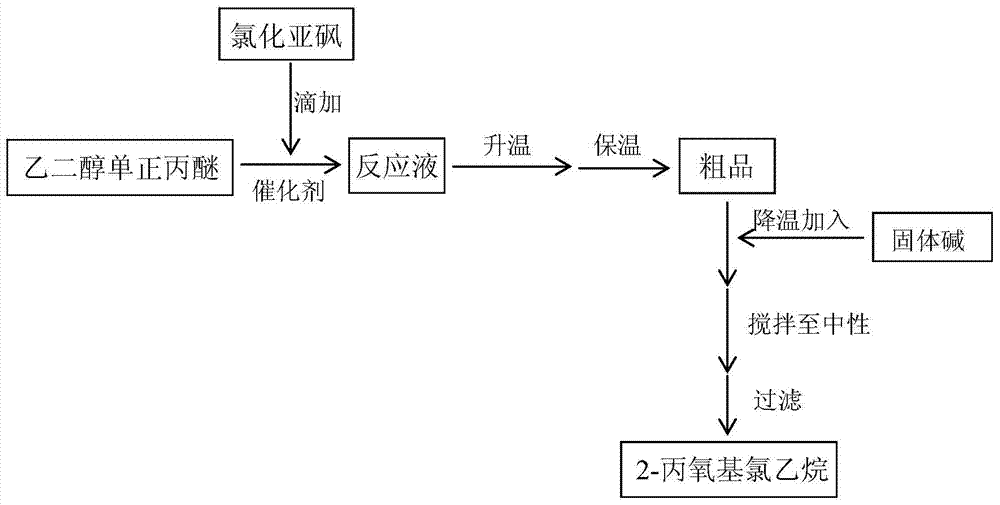The method for synthesizing 2-propoxyl ethyl chloride
A technology of propoxyl ethyl chloride and n-propyl ether, which is applied in chemical instruments and methods, preparation of organic compounds, organic chemistry, etc., can solve problems such as low product yield, high price, cumbersome process, etc., and achieve product yield The effect of high efficiency, low production cost and simple process
- Summary
- Abstract
- Description
- Claims
- Application Information
AI Technical Summary
Problems solved by technology
Method used
Image
Examples
Embodiment 1
[0029] Take 100g of ethylene glycol mono-n-propyl ether and 0.1g of dodecyltrimethylammonium chloride into the reaction vessel with reflux condenser, add 125.66g of thionyl chloride into the constant pressure dropping funnel, and heat to 35 ℃, start stirring, slowly add thionyl chloride dropwise to the reaction vessel, the reaction process emits sulfur dioxide and hydrogen chloride gas, control the thionyl chloride dropping rate to keep the temperature of the reaction liquid at 55±5°C.
[0030] After the addition of thionyl chloride is completed, gradually increase the temperature to 90°C according to the reaction gas evolution rate, until no gas is released, continue to keep the temperature for 2h to obtain the crude product; the crude product is cooled to 50°C, directly add solid sodium hydroxide and stir to thoroughly remove the thionyl chloride After decomposition, 116.19 g of 2-propoxychloroethane was obtained. After testing, the chromatographic content of the product was 99....
Embodiment 2
[0032] Take 100g of ethylene glycol mono-n-propyl ether and 0.3g of benzyltriethylammonium chloride into the reaction vessel with reflux condenser, add 131.4g of thionyl chloride into the constant pressure dropping funnel, and raise the temperature to 40℃. Turn on the stirring, slowly add thionyl chloride dropwise to the reaction vessel, the sulfur dioxide and hydrogen chloride gas are released during the reaction, and the thionyl chloride dropping rate is controlled to keep the temperature of the reaction solution at 60±5°C.
[0033] After the addition of thionyl chloride is completed, gradually increase the temperature to 95°C according to the rate of reaction gas evolution, until there is no gas evolution, continue to keep the temperature for 3h to obtain the crude product; the crude product is cooled to 40°C, directly add solid sodium hydroxide and stir to thoroughly remove the thionyl chloride After decomposition, 116.2 g of 2-propoxy chloroethane was obtained. After testing,...
Embodiment 3
[0035] Take 100g of ethylene glycol mono-n-propyl ether and 0.5g of methoxymethyl triphenylphosphine chloride into the reaction vessel with reflux condenser, add 137.1g of thionyl chloride into the constant pressure dropping funnel, and heat to Turn on the stirring at 45°C and slowly add thionyl chloride dropwise to the reaction vessel. Sulfur dioxide and hydrogen chloride gas are released during the reaction. The thionyl chloride dropping rate is controlled to keep the temperature of the reaction solution at 60±5°C.
[0036] After the addition of thionyl chloride is completed, gradually increase the temperature to 100°C according to the rate of reaction gas evolution, until no gas is released, continue to keep the temperature for 4h to obtain the crude product; the crude product is cooled to 30°C, directly add solid sodium hydroxide and stir to thoroughly remove the thionyl chloride After decomposition, 116.08 g of 2-propoxy chloroethane was obtained. After testing, the chromatog...
PUM
 Login to View More
Login to View More Abstract
Description
Claims
Application Information
 Login to View More
Login to View More - R&D
- Intellectual Property
- Life Sciences
- Materials
- Tech Scout
- Unparalleled Data Quality
- Higher Quality Content
- 60% Fewer Hallucinations
Browse by: Latest US Patents, China's latest patents, Technical Efficacy Thesaurus, Application Domain, Technology Topic, Popular Technical Reports.
© 2025 PatSnap. All rights reserved.Legal|Privacy policy|Modern Slavery Act Transparency Statement|Sitemap|About US| Contact US: help@patsnap.com


